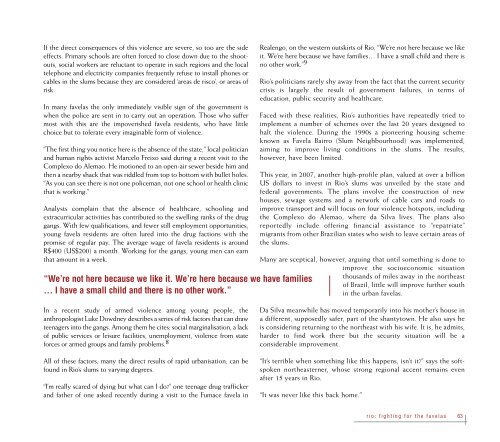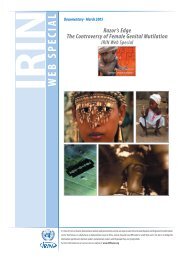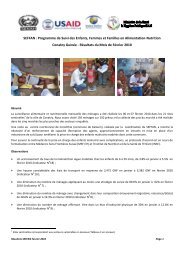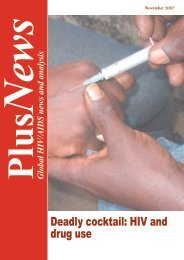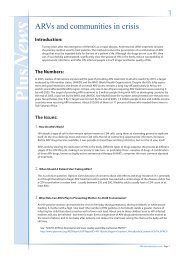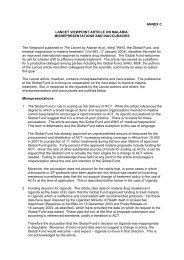Create successful ePaper yourself
Turn your PDF publications into a flip-book with our unique Google optimized e-Paper software.
If <strong>the</strong> direct consequences of this violence are severe, so too are <strong>the</strong> side<br />
effects. Primary schools are often <strong>for</strong>ced to close down due to <strong>the</strong> shootouts,<br />
social workers are reluctant to operate in such regions and <strong>the</strong> local<br />
telephone and electricity companies frequently refuse to install phones or<br />
cables in <strong>the</strong> slums because <strong>the</strong>y are considered ‘areas de risco’, or areas of<br />
risk.<br />
In many <strong>favelas</strong> <strong>the</strong> only immediately visible sign of <strong>the</strong> government is<br />
when <strong>the</strong> police are sent in to carry out an operation. Those who suffer<br />
most with this are <strong>the</strong> impoverished favela residents, who have little<br />
choice but to tolerate every imaginable <strong>for</strong>m of violence.<br />
“The first thing you notice here is <strong>the</strong> absence of <strong>the</strong> state,” local politician<br />
and human rights activist Marcelo Freixo said during a recent visit to <strong>the</strong><br />
Complexo do Alemao. He motioned to an open-air sewer beside him and<br />
<strong>the</strong>n a nearby shack that was riddled from top to bottom with bullet holes.<br />
“As you can see <strong>the</strong>re is not one policeman, not one school or health clinic<br />
that is working.”<br />
Analysts complain that <strong>the</strong> absence of healthcare, schooling and<br />
extracurricular activities has contributed to <strong>the</strong> swelling ranks of <strong>the</strong> drug<br />
gangs. With few qualifications, and fewer still employment opportunities,<br />
young favela residents are often lured into <strong>the</strong> drug factions with <strong>the</strong><br />
promise of regular pay. The average wage of favela residents is around<br />
R$400 (US$200) a month. Working <strong>for</strong> <strong>the</strong> gangs, young men can earn<br />
that amount in a week.<br />
“We’re not here because we like it. We’re here because we have families<br />
… I have a small child and <strong>the</strong>re is no o<strong>the</strong>r work.”<br />
Realengo, on <strong>the</strong> western outskirts of <strong>Rio</strong>. “We’re not here because we like<br />
it. We’re here because we have families… I have a small child and <strong>the</strong>re is<br />
no o<strong>the</strong>r work.” 9<br />
<strong>Rio</strong>’s politicians rarely shy away from <strong>the</strong> fact that <strong>the</strong> current security<br />
crisis is largely <strong>the</strong> result of government failures, in terms of<br />
education, public security and healthcare.<br />
Faced with <strong>the</strong>se realities, <strong>Rio</strong>’s authorities have repeatedly tried to<br />
implement a number of schemes over <strong>the</strong> last 20 years designed to<br />
halt <strong>the</strong> violence. During <strong>the</strong> 1990s a pioneering housing scheme<br />
known as Favela Bairro (Slum Neighbourhood) was implemented,<br />
aiming to improve living conditions in <strong>the</strong> slums. The results,<br />
however, have been limited.<br />
This year, in 2007, ano<strong>the</strong>r high-profile plan, valued at over a billion<br />
US dollars to invest in <strong>Rio</strong>’s slums was unveiled by <strong>the</strong> state and<br />
federal governments. The plans involve <strong>the</strong> construction of new<br />
houses, sewage systems and a network of cable cars and roads to<br />
improve transport and will focus on four violence hotspots, including<br />
<strong>the</strong> Complexo do Alemao, where da Silva lives. The plans also<br />
reportedly include offering financial assistance to “repatriate”<br />
migrants from o<strong>the</strong>r Brazilian states who wish to leave certain areas of<br />
<strong>the</strong> slums.<br />
Many are sceptical, however, arguing that until something is done to<br />
improve <strong>the</strong> socioeconomic situation<br />
thousands of miles away in <strong>the</strong> nor<strong>the</strong>ast<br />
of Brazil, little will improve fur<strong>the</strong>r south<br />
in <strong>the</strong> urban <strong>favelas</strong>.<br />
In a recent study of armed violence among young people, <strong>the</strong><br />
anthropologist Luke Dowdney describes a series of risk factors that can draw<br />
teenagers into <strong>the</strong> gangs. Among <strong>the</strong>m he cites: social marginalisation, a lack<br />
of public services or leisure facilities, unemployment, violence from state<br />
<strong>for</strong>ces or armed groups and family problems. 8<br />
All of <strong>the</strong>se factors, many <strong>the</strong> direct results of rapid urbanisation, can be<br />
found in <strong>Rio</strong>’s slums to varying degrees.<br />
“I’m really scared of dying but what can I do?” one teenage drug trafficker<br />
and fa<strong>the</strong>r of one asked recently during a visit to <strong>the</strong> Fumace favela in<br />
Da Silva meanwhile has moved temporarily into his mo<strong>the</strong>r’s house in<br />
a different, supposedly safer, part of <strong>the</strong> shantytown. He also says he<br />
is considering returning to <strong>the</strong> nor<strong>the</strong>ast with his wife. It is, he admits,<br />
harder to find work <strong>the</strong>re but <strong>the</strong> security situation will be a<br />
considerable improvement.<br />
“It’s terrible when something like this happens, isn’t it?” says <strong>the</strong> softspoken<br />
nor<strong>the</strong>asterner, whose strong regional accent remains even<br />
after 15 years in <strong>Rio</strong>.<br />
“It was never like this back home.”<br />
r i o : f i g h t i n g f o r t h e f a v e l a s 63


